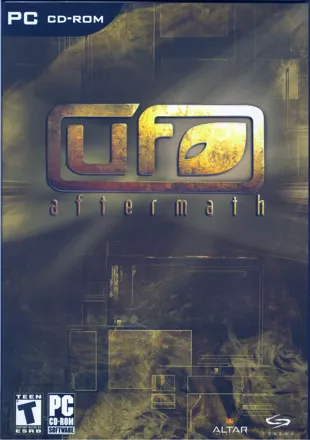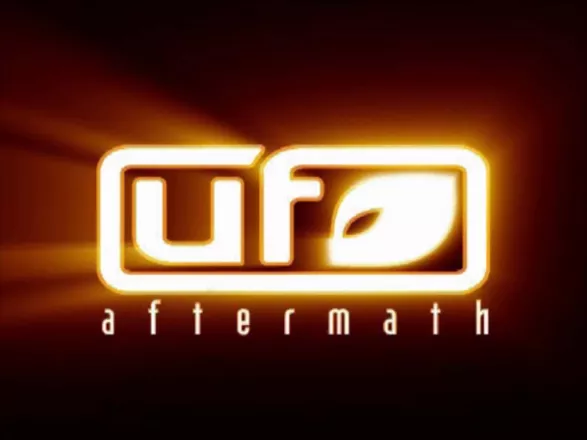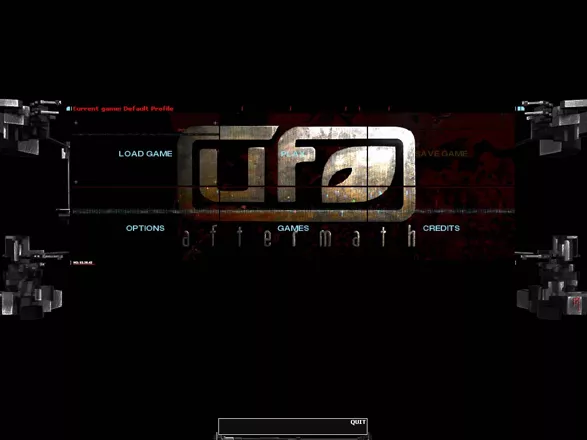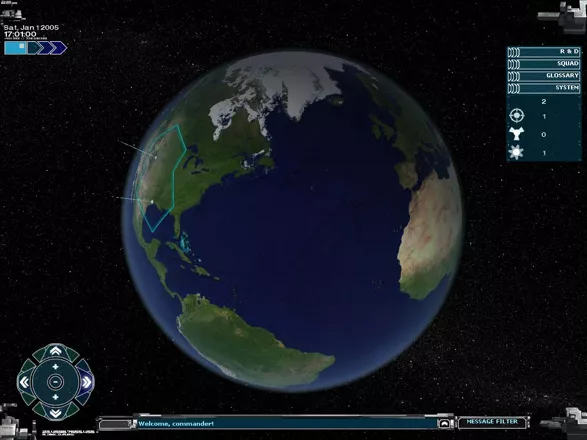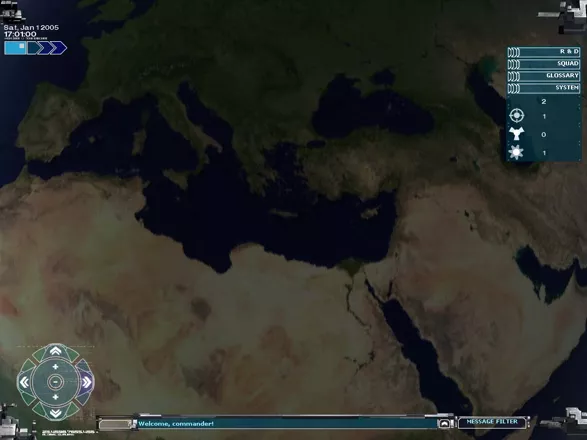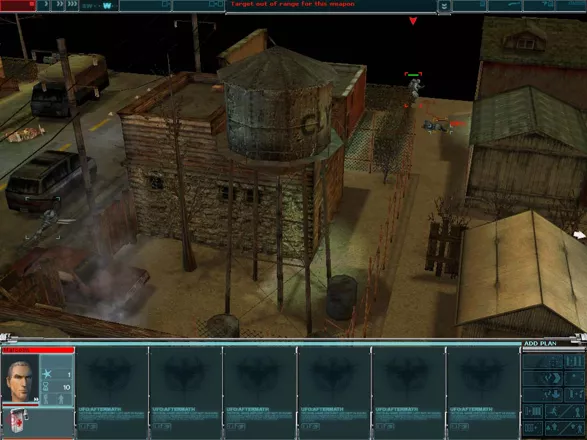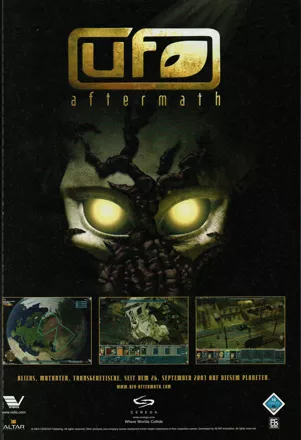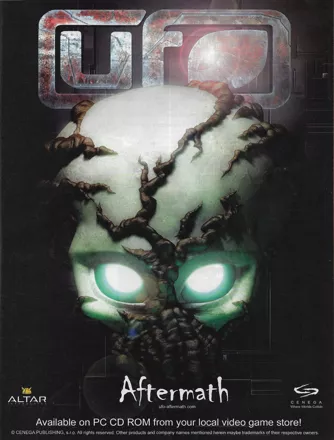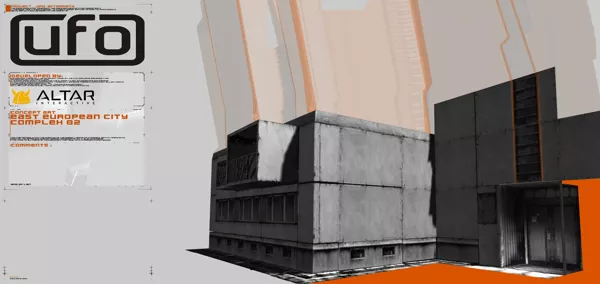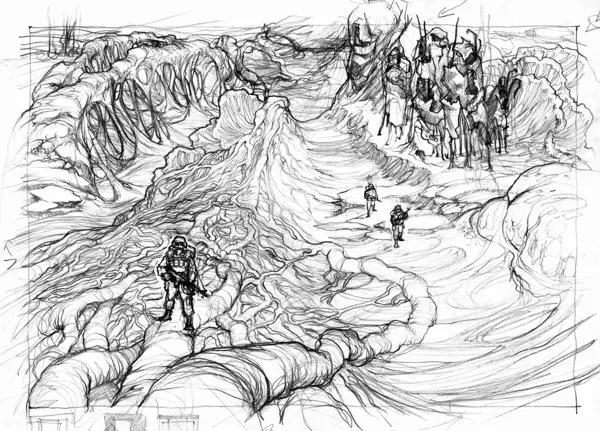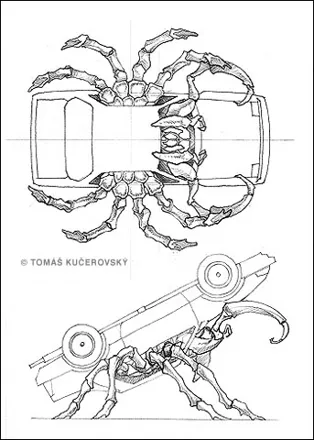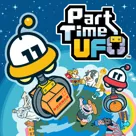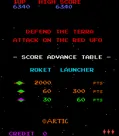UFO: Aftermath
Description official descriptions
In the year 2004, Earth is suddenly overcome by "spores" launching from an alien mothership. Slowly blocking earth from the sun, in only a week it rains down biological death on the earth... killing most of humanity and larger life forms.
Since then, the few survivors of mankind have sought out each other, and by 2005, enough humanity has joined together to make a stand. Calling themselves the Council of Earth, and working secretly in hidden bases, they must research, recruit and train to the ultimate goal of shooting down UFOs, engaging aliens in combat and reclaiming the Earth from their oppressors and the mutated biology.
This game is VERY similar to the cult favorite, X-Com but with a post-apocalyptic War of the Worlds (or perhaps "V: The miniseries") feel to it. Much of the game takes place on the world map where you choose which missions to attend to, where to build new bases (and what type) and your overall sphere of influence. Additionally, you control Research & Development and current equipment for your squad.
On the 3D map of each "area" however, the game is real-time strategy that pauses to allow you to give orders to your forces. In fact, at the end of queued actions or whenever something 'signifigant' is noticed, the game stops allowing you to put together a strategy. Just as in X-Com, these areas are limited in size, and visibility. However objectives vary.. killing all enemies is not always the purpose of a mission. Soldier development is also fairly detailed. The skills your squad uses out in the field they will get better at (they gain experience individually). Additionally when they reach certain prerequisites in their base stats, they can train to get better at certain skills, including Soldier, Medic, Scientist and others.
Spellings
- UFO: Нашествие - Russian spelling
Groups +
Screenshots
Promos
Videos
Add Trailer or Gameplay Video +1 point
See any errors or missing info for this game?
You can submit a correction, contribute trivia, add to a game group, add a related site or alternate title.
Credits (Windows version)
74 People (69 developers, 5 thanks) · View all
| Project Manager | |
| Design Lead | |
| Lead Programmer | |
| Creative Director | |
| Lead Animator | |
| Programmers | |
| Freelance Programmers | |
| Artists | |
| Freelance Artists | |
| Animators | |
| [ full credits ] | |
Reviews
Critics
Average score: 68% (based on 33 ratings)
Players
Average score: 3.2 out of 5 (based on 35 ratings with 8 reviews)
Tactical combat freaks will enjoy this game
The Good
There are strong surface similarities between UFO and X-COM, but U:A is a very good game on its own merits. The combination of individual tactics and a captivating plot results in an amazing game where you can use several powerful weapons to combat the alien enemies.
The graphics are pretty competent and both the sound effects and the voice over are very good. Also the world map is well done and very detailed.
The Bad
The tactical interface could have been a bit user-friendlier: it takes some time getting used to.
The Bottom Line
I have played the game for a week and I just love it.
Windows · by Tommy Wood (38) · 2004
An attempt on reviving a classic ... sadly a failed one
The Good
The best thing that can possibly be said about UFO: Aftermath is that, even if the developers claim otherwise, the game is a spiritual successor of the classic X-Com.
However, the guys at Altar obviously thought todays gamers would be overwhelmed
by the multitude of options and repelled by the time-consuming turn-based battles.
Said and done, geoscape was reduced to a minimum.
For example, funding now isn't an issue, you needn't worry about the layout of
your bases any longer, you just set them to one of three (in the late game four) basic
modes-of-operation and be done with it, squad management is now a breeze, because you can never have more than one single squad anyways, etc.
Likewise, the squad-battles themselves have been turned into RTS-like fashion, essentially they now play very similar to the combat seen in Baldur's Gate.
In an effort to bring in a tad strategy, "important" events, like a friendly unit
under fire or the sighting of a foe, will auto-pause the game. All these events can
be disabled, though.
The graphics, while not exactly top-notch, are nicely done, but you're very likely
to be playing at the maximum zoom-out, so you'll miss a lot detail. What you'll notice is that Altar has gone great lengths to give city missions in different locales a memorable outlook, and they succeeded, cities in Russia, Australia, North America and Asia all look entirely different, which is a pleasant feat.
The Bad
If you're out of Elementary School for any amount of time, you'll likely feel that
the game has been dumbed down a bit TOO much.
Apart from the aforementioned base-simplifications ...
You can only produce a single item at a time, and can only have a single research project going. In the late game, you'll have a dozen manufacturing bases around the globe cooperating for a day to solder together a single laser pistol.
And you can't even tell them to keep going until 10 are ready. No, single items only.
A single squad, 7 members, will be on all your missions around the globe. Sure, you can let it consist of various group-members at a time, but only one active squad is allowed.
(And still it's very likely three of your seven squad members have exactly the same voice...)
These are only a few examples for the nuisances on geoscape level.
But what about the squad-battles?
In order to allow for the freely-rotatable 3D real-time environments, a lot of
tactical possibilities had to be sacrificed.
Remember the height levels in X-COM? Gone, just a "flat" map now.
Remember the possibility to enter every building, from the gas-station to the toolshed? Gone, only bases and UFOs can be entered now, effectively switching to an entirely different map.
Remember the possibility to take cover? Gone, the aliens will hit you hard, no matter if you're standing upright on open ground or if you're kneeling behind a car-wreck in the ruins of a city, if they can see you, they'll hit you.
(Might have something to do with the fact all actual aliens have "heroic", the best level, in all their stats.)
I'll stop here, though plenty more similar weaknesses could be pointed out here.
The Bottom Line
All the simplifications I listed above were done for a reason. However, many weren't actually finished to the point they were first planned, because developing time ran out.
Others were finished, but don't reach the goal they had in mind.
In the bottom line, the game just lost too much profile.
Even if you can forgive or live with all the mentioned shortcomings, there's still another aspect: The Story. It's is a patchwork of different "wouldn't it be cool if we had" things that don't really belong into the same storyline, it's presented very badly (apart from the intro and extro, there's only a number of text-windows and the shortish descriptions of the research projects) and, if compared to the original X-COM, UFO:AM just isn't fun to play.
That said, this isn't a bad game, not at all. It's quite nicely done and reaches an acceptable level on almost all levels, but it fails to set itself apart from the crowd.
It's solid, yet far from good, let alone exceptional.
IF I remember this game in a decade, like I fondly remember X-COM today, I'll only remember it because it tried to resurrect a classic that I remember, not because it was a classic itself.
Windows · by Cadorna (219) · 2003
The Good
Having never played X-Com, this review will lack the combination of nostalgia and righteous indignation I’ve been seeing on the web.
On May 25, 2004, a flying saucer will enter the Earth’s atmosphere. Attempts to make contact with it will be futile. The saucer will unleash a biotoxin killing most of the life on Earth. The remaining humans will form the Council of Earth, a global authority combining scientific and military resources to reclaim the Earth. But the Earth has changed. Terran life not killed by the biotoxin has been changed into transgenants, alien craft patrol the skies, and rumors abound of an alien biomass devouring continents.
UFO: Aftermath is a real-time strategy game, divided into a Strategic game and a Tactical game. The strategic game plays out from world map. From the global view you can initiate new research, direct the development of new technologies, manage your squad (including equipping and training them), order your aircraft to intercept UFOs, and send your squad on missions.
Missions take place during the tactical portion of the game. There are several varieties of missions, but they all involve moving your squad, of up to seven members, through a well drawn 3D map, engaging hostile forces, and accomplishing certain objectives.
All this sounds better than it actually is.
The Bad
In UFO: Aftermath, the player is reactive rather than proactive. In the strategic/world map portion, you have to wait for missions to come available rather than directing the attack against the aliens or the biomass or anything else. I understand that you are really following the orders of the Council of Earth, but that aspect is so poorly implemented that it seems irrelevant.
In the tactical portion (where you spend most of the game) things aren’t better. To begin with, your team has no AI. They will only do what you tell them to do and then they do it in real time. This includes managing their inventory. Here’s how annoying this is—your medic needs to heal someone, so you open up their inventory and rearrange the Tetris puzzle that is the inventory system to put their rifle in their backpack and put a health pack in their hands. Then you jump back to the tactical view and have to wait for them to rearrange their inventory like you just did. Giving them an order too soon afterwards cancels everything out.
In combat this is worse. You cannot give standing orders to your troops to defend themselves. You have to tell them what to do, step by step… and listen to them talk. Every time you tell your troops to do something they have to respond with their inane accents and attitudes. Painful.
Missions come in several varieties. The best ones are story missions, which further the plot and feature the best level design. The other ones seem to be randomly generated and are repetitious. You have the option of delegating missions, but the computer controlled teams aren’t as good. So I kept playing the same types of missions over and over and over.
I’m going to gloss over the aircraft interceptions of UFOs. And the fact that there’s only one helicopter, but infinite planes. Should I mention how bad the sound is? The fact that enemies make no noise? The uninspiring weapon effects?
UFO: Aftermath isn’t good.
The Bottom Line
I appreciate what Altar was trying to do here, but they fell way short of producing a quality product. Internet rumors mention that they had no time for playtesting and that there was pressure to get the game out the door. Early interviews with the designers show that they had a grander vision than they were able to deliver.
I was hoping for a game I could sink my teeth into. A complex and dynamic game that offered hours of play and replay. Instead I found UFO: Aftermath to be interesting from the outset, but it rapidly became tedious and ended up unrewarding.
Windows · by Terrence Bosky (5397) · 2004
Trivia
Many of the graphics are regionalized. For instance, European cities look very different than American cities. Additionally, you may select your starting region from the GAMES menu.
Analytics
Upgrade to MobyPro to view research rankings!
Related Sites +
-
IGCD Internet Game Cars Database
Game page on IGCD, a database that tries to archive vehicles found in video games. -
UFO: AM > HQ
Official website
Identifiers +
Contribute
Are you familiar with this game? Help document and preserve this entry in video game history! If your contribution is approved, you will earn points and be credited as a contributor.
Contributors to this Entry
Game added by Shoddyan.
Additional contributors: Corn Popper, JRK, Stratege, Victor Vance.
Game added October 5, 2003. Last modified March 6, 2024.
